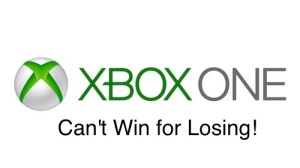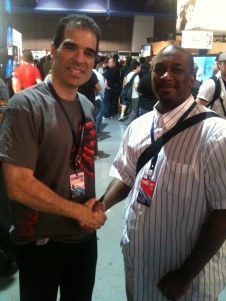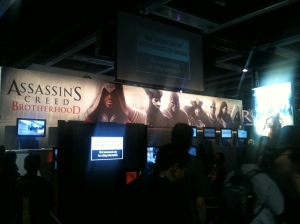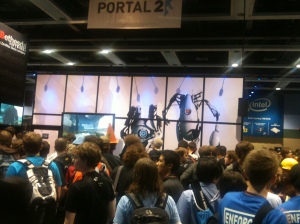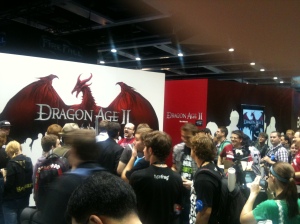Posts Tagged Console
Microsoft: Your DRM Policy Wasn’t Entirely ‘Bad’
The media frenzy with Microsoft and the Xbox One continues. In a surprising turnabout, Microsoft has decided to reverse their Xbox One DRM policy. It turns out that vocal minority of whiny gamers wasn’t so minor after all. However, the cynic in me believes that pre-order numbers must’ve dropped at such an unbelievable rate that Microsoft felt compelled to respond in order to stay competitive against Sony’s PS4. But quite frankly, this was NOT the right move to make.
There’s no doubt Microsoft needed to respond to Sony after E3. But conceding on what was essentially the linchpin to their long term strategy was too reactionary. In some ways it reflects a lack of confidence they may have had in their original plan. If Microsoft was truly dedicated to moving gaming into a new digital age that benefited everyone, then they should have stuck to their guns despite the mountain of bad press. Instead, Microsoft backslides into the safer, short term bet of retaining their current customer base instead of betting the farm on the longer term rewards and learnings. All of this just smacks of weakness.
If anything, I was assuming if Microsoft scaled back on the mandatory functionality of the Kinect 2; if not stripping it out completely to cut back the price. This would have easily made it more competitive with the PS4. To date, I have yet to find any information on why the Kinect 2 is critical to gaming on the Xbox One. If any of you do, please share it with me. Removing the Kinect 2 would’ve been a more sensible strategy given the reservations many still have about it. But this was a head-scratcher from day one. If they were going to make the Kinect 2 mandatory, why not just build into the system in the first place? This most likely would have greatly increased the manufacturing costs. But that’s a cost Microsoft can eat. And it would have easily justified the $500 price point. However, Microsoft is set and locked with Kinect 2 still being mandatory despite removing DRM.
The real culprit throughout this whole Xbox One debacle can be boiled down to one issue: Microsoft’s Ineffective Communication!
From day one, information from Microsoft has been a whirlwind of conflicting sources and vague half-truths. The message about Xbox One has failed to be consistent. Not only that, they’ve failed to really be entirely forthcoming about how the new DRM policy would help benefit consumers and studios. Admittedly, there are sources outlining some of these details, but not many that clearly painted a picture of the how it translated to users in a practical manner. It wasn’t until I found this obscure article referencing an Xbox One engineer that the whole DRM really made sense. But when the head of Xbox is making flippant comments about disadvantaged consumers combined with everything else, how do you expect consumers to react? And lets face it, they knew enforcing DRM was never going to be a popular decision. But they should have done a hell of a much better job helping consumers embrace the changes and conveying the benefits that could follow.
Losing DRM eliminates many of the planned services Microsoft had in mind such as digital access to games, family sharing, lower game price points and more. These were all great ideas building on what Steam is already doing. And honestly, it would have been worth the risk. But Steam also has an OFFLINE mode. Why couldn’t Microsoft offer a similar option for Xbox One? They could have avoided a mountain of resistance around the required internet connection and the 24 hour check.
Many outlets view the reversal as a major win for consumers. And in some ways, it is (despite my cynical inference). But there’s no denying, games are transitioning more to the digital space. And Microsoft tried to embrace that change. Whether or not it was the ‘right‘ approach is neither here or there. The true winner here is Gamestop and other used retail outlets, not consumers. But this still put smaller studios in more danger of layoffs and closures as game production continue to increase. But as I mentioned in previous posts, the ballooning cost of game development really needs to be re-evaluated. But more importantly, publishers and developers need to crack down on Gamestop and other used retailers for lost revenue. There’s no sound reasons publishers and studios should not be getting a cut from used games sales. That dynamic should have been resolved by now. There is a solution in that relationship, and it’s not by passing the cost down to the consumer.
The DRM reversal also raises a few new questions such as: what does this mean for indie developers? Will the XBLIA space operate under the same manner or is it it still closed off? What does this mean for digital downloads, especially new titles? What about cloud gaming? Sony is already ahead of the curve in this regard. For quite a while, the Ps3 has been offering day one digital downloads for new titles. Sony is poised to stab the knife further into Micosoft’s back if they can offer day one downloads at discounted prices, say $49. And if the rumors of cloud gaming for PS3 titles on the ps4 is true, Microsoft has a lot of catching up to do.
Sadly, even with DRM removed, the Xbox One just doesn’t come off as a more appealing option over the PS4. Bottom line: Microsoft still has a more expensive console with minor issues lingering around Kinect 2. It would have been really interesting to see what Microsoft had in the works and how it played out. One thing is for certain: this console war just got a whole lot more boring. Now we have two similar systems that weren’t event that revolutionary to begin with. Congratulations gamers, your voices (and complaints) were heard loud and clear. Now lets see if you’ll be happy with the fallout of what’s to come.
XBox Done!? Is Microsoft Losing Focus or Over-Reaching?
Posted by Waymon in Gamers, Gaming Culture, Marketing, Microsoft, Nintendo, Playstation, PS4, Video Games, Xbox, Xbox One on June 11, 2013
Video Game Budgets: What’s Going On?
Posted by Waymon in Business, FPS, Franchise, Gamers, Industry, Markets, Movies, Multiplayer, Nintendo, Playstation, Playstation Network, Sales, Sony, Video Games, Wii, XBLA, Xbox, Xbox 360, Xbox Live on July 9, 2012
A few weeks back, I read an article with EA head honcho, Frank Gibeau. And one statement especially jumped out to me:
“In general we’re thinking about how we make this a more broadly appealing franchise, because ultimately you need to get to audience sizes of around five million to really continue to invest in an IP like Dead Space. Anything less than that and it becomes quite difficult financially given how expensive it is to make games and market them. We feel good about that growth but we have to be very paranoid about making sure we don’t change the experience so much that we lose the fanbase.”
This strikes me as odd and flat out preposterous. I’ve always been curious about video game budgets. They just keep growing and growing. I’ve tried poking around for a few detailed breakdowns with no avail. But something is not adding up. These budgets run more than many Hollywood movies. That alone is crazy. Once all the costs for licensing, royalty fees, art, QA, post release support and all that is factored in, you’re already looking at pretty chunk of change. And don’t forget marketing / PR, that alone is sometimes more than the cost of the game itself. Talk about outrageous, but we’ll save that topic for another time. In the end, the budget for a standard console/PC game shouldn’t run more than a few million. So where are they coming up with these inane figures like $25-$100 million? And what kind of metrics ans analysis are they doing that indicates the need for so many buyers to justify a franchise. In fact, I’d really like to see a case study detailing video game production costs & sales in contrast to other industries particularly movies and other technologies (laptop, mobiles, etc.). I realize that sometimes there is a price to be paid for quality; but worth 500 million users? I highly doubt that. Again, something is NOT adding up.

The sad but current state of video game budgets
And is it really necessary? The need to appeal to a broader audience is just a systemic of business in general. But many franchises, and games in general, are starting to suffer with dwindling sales month over month. Typically these days, a standard AAA game starts out as a first person shooter (FPS) built on an Unreal Engine with a tacked on gimmicky multiplayer mode. And now it seems, they’ll be more co-op. I, personally, love co-op mode; but it seems that co-op today translate more into action shooter. That aside, including all these features quickly add up to a pretty penny. But do these companies even considered if it’s germane to the business or the final product itself ? Why does a game such as Dead Space and Assassin’s Creed need MP modes? TellTale is already making a phenomenal Walking Dead game, is it really necessary for Activision to make one as well (which, surprise surprise, will be a FPS)? To me, it seems like a massive waste time and resources when they would be better off capitalizing on different markets. Do they really think they’re gonna capture that many more gamers with such a such a commonplace format? I’m not saying they should ignore these kind of opportunities. You never know what could happen. Case in point, I thought adding MP to Mass Effect 3 would be a colossal failure. But it turned out to be a massive success. So I’m all for trying new ideas, just maybe in a different manner. In fact, I’d love to see the numbers around these figures. It may be worth holding off some new features as optional DLC only to be included in future installments based on a scale of their popularity.
But even if that were the case, it still doesn’t account for the absorbent budgets. Countless indie developers have found marginal to great success producing games on a shoestring budget. Why don’t major publishers release smaller titles in a similar manner more often? Everyone wants to produce the next biggest hit, but wouldn’t it be more prudent to release a string of lower budget titles to help back bigger releases? Movie studios release generic romcoms (romantic comedies) and other low budget clunkers all the time. That’s possible because studios know there’s a market out there willing watch them. Even though movies and games are two different monsters, studios should know there’s a similar (huge) contingent of gamers that’d like low budget title. Low budget titles doesn’t mean low quality. If you need proof of that, look no further than the countless indie developers and other standard titles that have found great success with not even a 1% of the budget. Just like mindless popcorn flicks, sometimes all a gamer wants is just a regular game, not an over-produced blockbuster. But game studios are very risk adverse. The common excuse is that the physical production and release costs is not worth it, especially if it flops. That and they’re pushing gaming more to the digital front. Regardless of the chosen avenue, companies are missing out on a sizable potential market. They already have a dedicated segment of gamers on lock (and potentially more). Gamers like me aren’t going anywhere. This is no excuse for developers to become complacent and produce cookie cutter crap. But it could allow studios and developers more opportunities to take new risks.
All said and done, something needs to happen with the heavy imbalance between budgets and the decreasing sales. I sure as hell don’t have all the answers but based on declining sales, the business aren’t just as clueless in some ways. Right now, there are more than a few lucrative opportunities and markets the game industry capitalize on they’re just ignoring or frankly how no clue how to. But I just hate seeing the traditional console market suffer from their inability to stick to basics and not take advantage of an already, dedicated fan base. Like the saying goes: if it ain’t broke, don’t fix it. And right now, there’s too much fixing going on.
What do you think people?
Inked Up (or My First Tattoo)
Posted by Waymon in Charity, Children's Miracle Network Hospital, Extra Life, Hospital, Seattle, Support, Tattoo, Video Games, Volunteer on January 4, 2012
This post is long overdue. Back in October I participated in a charity event to help support my local Children’s Miracle Network Hospital: Extra Life. As an effort to raise money, I promised that I’d get a tattoo if I reached my goal. With just a few hours left, I surpassed my goal thankfully. And true to my word, the following week I went out and got this…
This is slightly more detailed version of the Extra Life 2011 logo courtesy of Lucky Devil Tattoo Parlor here in Seattle. I was one of those people that always wanted a tattoo but wasn’t sure what to get. But this choice seems fitting: it portrays my passion for gaming. At the same time it’s not for entirely selfish reasons. It’s also a reminder to me that there’s people out there who need more help than I ever would; as such, I should really be grateful for what I have in this fleeting life.
I can’t wait for Extra Life 2012. I’ll definitely be participating again. And I’m definitely considering getting another tattoo if I reach my goal. But this time, I may leave the decision to my sponsors as to what I’ll get. Stay tuned.
The PAX Experience
Posted by Waymon in 2010, Nintendo, PAX, Penny Arcade, Playstation, Seattle, Video Games, Xbox on September 8, 2010
This was my first time attending the Penny Arcade Expo (PAX). And I’m proud to say it was one of the most exhilarating and insightful experiences I’ve ever encountered. The sheer amount of diversity among the gaming community is amazing. But even more surprising was the congenial nature of the event. It didn’t matter what type of gamer you are, personal background, or any other discriminatory factor; everyone came together and just had a great time. It truly was a beautiful event and I will definitely be there next year. First, I’d like to a give shout out to Dave (from Ontario) for procuring my PAX badge on such late notice. Dave was even nice enough to let me join his group for awhile and grab lunch. We’ll definitely hook up again for next year’s PAX. Another shout out to Tom (from Couchsurfing) for allowing me crash at his place during PAX. Tom and I have so many hobbies and traits in common it was frighteningly weird. But seriously, Tom was awesome and look forward to many future outings.
Most of my time was just spent bouncing around from different panels, visiting various booths, and socializing with other gamers. I even played my first tabletop game, Battlestar Galactica, and a really fun dice game called Zombie Dice. While I did enjoy myself, next year I’d like to go with a group of friends instead of solo. Being alone can be a bit bothersome at times, but I was fine with it for the most part. Regardless, there was always someone in the same boat as me, so it wasn’t too bad. In hindsight, the whole point of PAX is not about checking out the latest, upcoming games and the free swag. But it’s to create a welcoming environment where gamers of all sorts can convene, have fun with one another, and just be themselves.
Highlights of PAX 2010 :
- Meeting Ed Boon practically five minutes after entering the expo hall, EPIC WIN!
- Microsoft Kinect was actually impressive and a lot of fun.
- Twisted Pixel continues to create simple, yet highly impressive fun games, Comic Jumper will be their best game to date.
- Meeting some of the great people from MS / Xbox. Shout outs to: DMZilla (who forgot who I was the next day when we were in the elevator), EverettGresham (you still owe me a drink), MacheteBetty, Esko, and EpicAndyB
- Most Impressive Game: Dead Space 2
- Biggest Surprise: Brink
Quite honestly, the FPS genre has been played out these past few years in my opinion. But something about this game has a certain charm that grabbed me. - Most disappointing Game: Fable 3
This series has always been underwhelming and just bland. And quite honestly, this game is even more streamlined and “simple’ than the previous incarnations, which is hard to believe.
As awesome as PAX is, there were some shortcomings and disappointments. I’d like to see more…’unique’ discussion panels. Do we really need to have yet another panel dealing with “the Myth of the girl gamer”? Yes, we all know there are women gamers out there. Hell, I’d even say quarter, if not a third, of the PAX attendees were women. They made up a larger portion of the group more so than the minorities. Point being: it is no longer a myth or a rarity even. Let’s focus on something more unresolved such as the lack of diversity in gaming (from hiring to the game characters themselves) or ways to bring gaming to disadvantaged people and / or less fortunate communities, or investigate ways gaming can be used for more educational / professional training purposes.
Additionally, some of the lines were just too long. You could literally spend all day in 4-5 lines to play a 10-15 minute demo and that’d be your whole day. Either they need to add an extra day to the event or secure more space for some of the larger developers / publishers. This way attendees (especially for one day attendees) can see and try out a good portion of games without feeling rushed.
Next year, I’m looking forward to more games, more parties, and more fun overall. This was a much needed excursion for my soul. But alas, the vacation is over and now it’s back to the daily grind of hunting for my dream job. But not to worry, this experience has invigorated me with a stronger resolve. I have a good feeling about my future.
In the meantime, here are few pictures. I know the quality is crappy. But that is due to the iPhone 3GS camera being utterly horrible.
